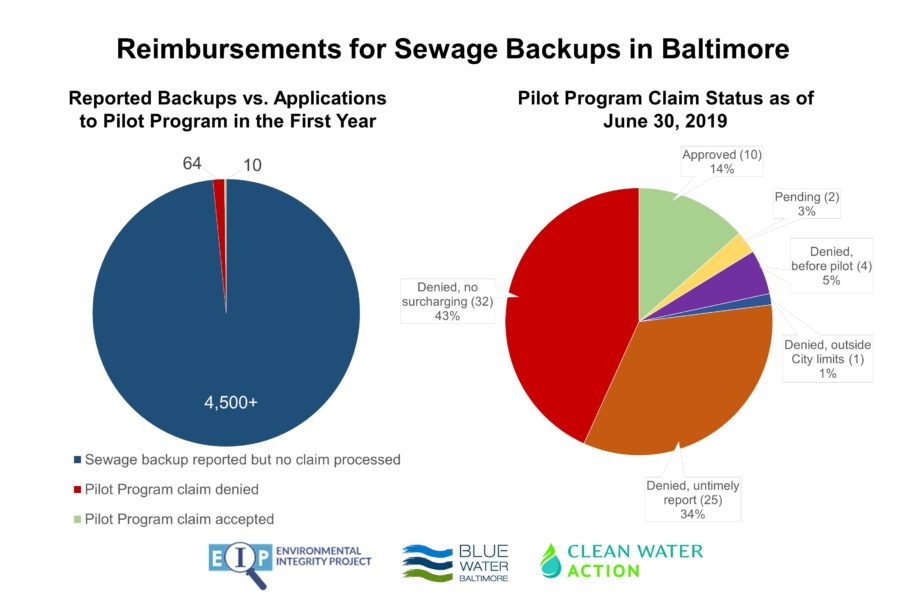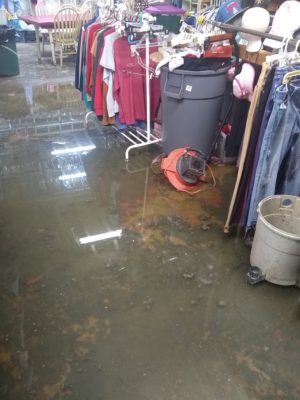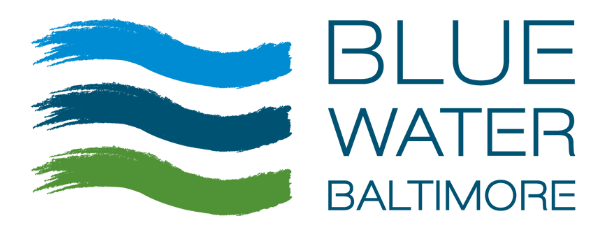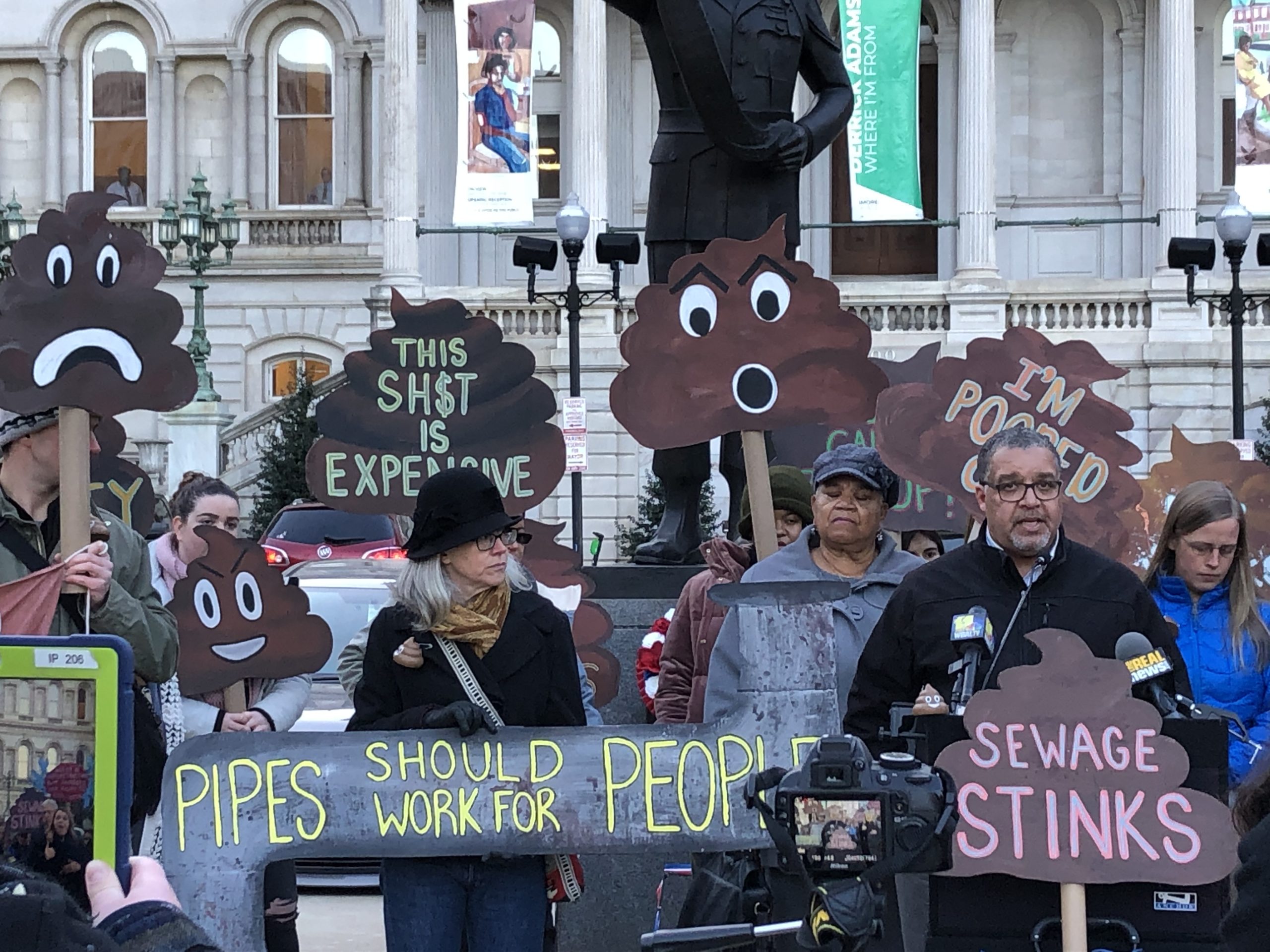Action Alert: Speak Up Against Sewage Backups!
This hearing has been postponed due to COVID-19. We will share the new date as soon as it is rescheduled.
Sewage doesn’t belong in our streams – or our homes.
Sewage backs up into thousands of homes in Baltimore every year due to heavy rainfall coupled with the city’s crumbling infrastructure. These backups put residents’ health, homes, and financial security at risk.
Join us for the next public hearing on sewage backups!
What is this hearing about?
Sewage backups can cost thousands of dollars to address, from cleanup and disinfection to replacement of damaged property, not to mention other potential costs such as illness and lost work days.
In April 2018, Baltimore City launched a pilot Expedited Reimbursement Program to help residents cover the cost of cleaning up sewage backups in their homes. The pilot program is supposed to pave the way for the City to create a permanent program required by the federal Sanitary Sewer Consent Decree, but there are serious problems with the program’s design and administration.
During the first year of the program, over 4,500 residents reported sewage backups to the city. Yet only 74 people applied for reimbursement, demonstrating that this program is not well advertised to the public — how can you apply for a program you don’t know exists? And of those 74 applicants, only 10 were approved for reimbursement. Everyone else was denied, largely due to burdensome qualification requirements.

How do we improve the reimbursement program?
There are steps the City can — and should — take to ensure that Baltimoreans get the support they need in case of a basement sewage backup. Our recommendations to improve the reimbursement program include the following:
- The City should assume responsibility for a sewage backup until proven otherwise. Right now, the burden is on residents to prove the city is at fault for sewage backing up into their homes. This is backwards.
- The program should be available for backups caused by any condition in the public collection system, not just backups caused by surcharging or wet weather events.
- Residents should have at least 72 hours to notify the City of a backup. Currently, residents only have 24 hours to report a sewage backup to qualify for reimbursement. Imagine raw sewage is spewing into your basement. Chances are, the last thing you’re thinking about is calling 311. Yet over ⅓ of all applications to the reimbursement program are denied due to “untimely” reporting. This is particularly important given that the City’s 311 call system is not staffed 24/7, and 25% of Baltimoreans do not have access to the Internet at home to report online.
- The $2,500 cap on reimbursement should be removed. Residents can face $10,000+ in damages after sewage backups. Raising the cap will help residents get the full cleanup services and support that’s needed.
- Full reimbursement should be available for property loss. The current program only allows funds to be used for sewage removal and disinfection. Cleanup costs can make up just a fraction of expenses after a sewage backup. Replacing furniture, hot water heaters, furnaces, and other valuables stored in basements often comes with the biggest costs. The reimbursement program should allow funds to be used for property damage, too.
- DPW needs to advertise the program better. 311 call system operators must be properly trained to inform residents who report a backup about the reimbursement program. DPW should use more channels, such as social media, their website, door hangers, and other tactics to make residents aware that this program exists.
- The City should provide direct and immediate cleanup assistance to residents who experience a backup in their home. Coming into contact with raw sewage poses significant health hazards. Residents should never be expected to put their health at risk to clean up a sewage backup. Other cities like Cincinnati, Ohio provide timely cleanup assistance to residents who experience backups. Baltimore should do the same.
How can I get involved?
In November 2019, we stood with residents who have experienced sewage backups, public health experts, faith leaders, and coalition partners at a rally and public hearing at City Hall to demand that Baltimore City pay up for these backups.
After three hours of testimony, the City Council’s Land Use Committee recessed the November public hearing and committed to holding another one to continue this critical conversation about how the City can better support people dealing with basement backups and fix our crumbling infrastructure.
That follow-up hearing has been scheduled for March 17th, and we need your help to ensure it leads to tangible results:
- Sign up for our newsletter to make sure you stay up-to-date on the status of this hearing.
- Have you experienced a sewage backup? Contact me if you’re interested in testifying at the next hearing or submitting written comments at [email protected].
- Learn more by downloading our handy sewage backup fact sheet and infographic.


